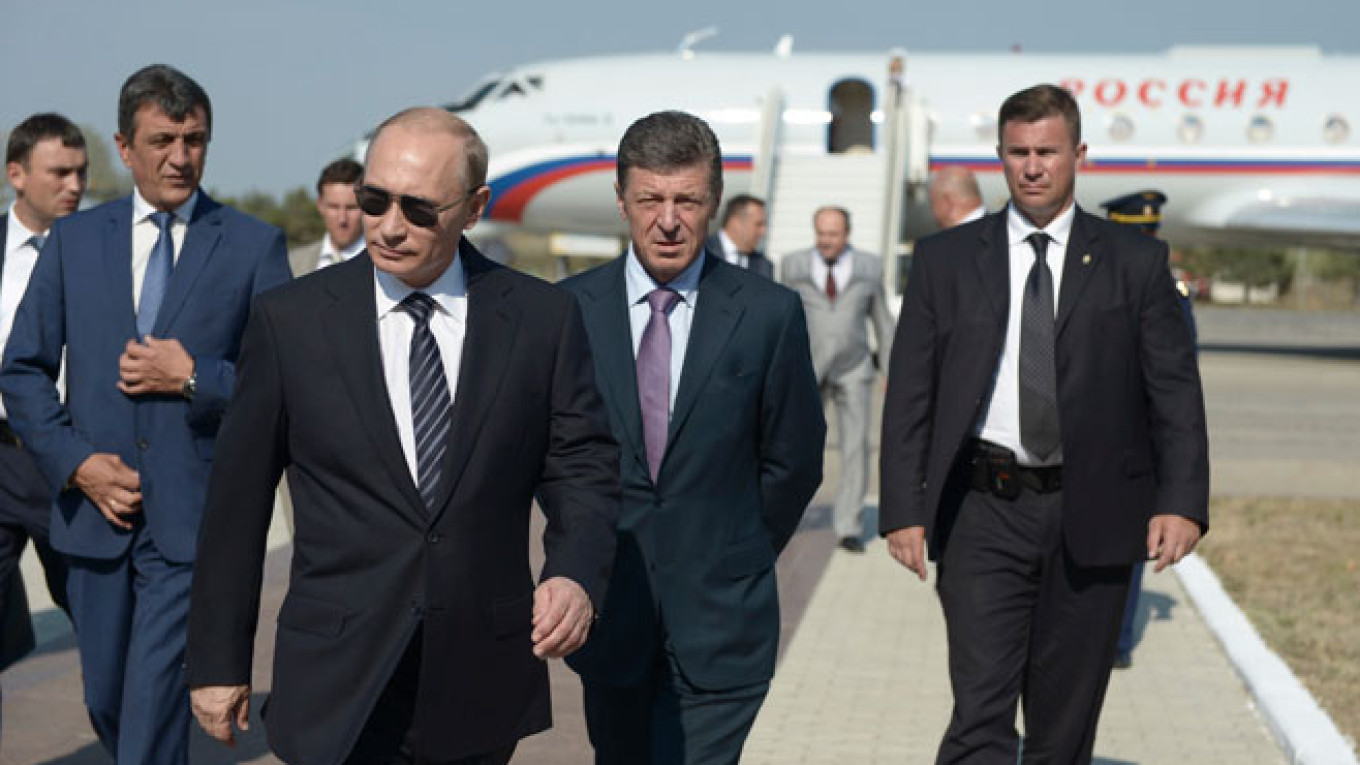As President Vladimir Putin touched down in the Crimean city of Sevastopol on Wednesday, a poll revealed that his support among voters has almost doubled since January, largely due to the Kremlin's policies in Crimea and Ukraine, analysts said. ?
The turmoil in Ukraine and the annexation of Crimea in March have galvanized public opinion behind the president, but this level of support cannot be maintained indefinitely, and eventually Putin's approval ratings will return to the pre-Ukraine trend of a sluggish decline, according to sociologists and pundits.
While back in January, only 29 percent of Russians said they would vote for Putin if a presidential election were held that weekend, in July that figure had risen to 52 percent, according to a survey released by the independent and respected Levada pollster Wednesday.
Among the respondents who said they would vote and knew whom they would choose, 82 percent said they would vote for Putin. This represents the figure that Putin would likely get if elections were held this weekend.
Putin garnered 63.6 percent of the vote in the last Russian presidential election in 2012. Shortly before the Ukraine crisis unfolded in central Kiev late last year, his approval rating had hit its lowest since he first became president in 2000: In November, 61 percent of respondents told the Levada Center they approved of Putin's activities, while in July that figure was 85 percent.
All Levada Center surveys cited in this story were conducted among 1,600 respondents with a margin of error not exceeding 3.4 percent.
Extraordinary Is the New Normal
The ongoing bloody conflict in Ukraine and the annexation of Crimea have fundamentally changed the way the Russian public perceives the Kremlin's policies, according to Levada Center head Lev Gudkov.
"What has happened is that the state-run media, government institutions and even parts of civil society have adapted to this new situation, this "us-versus-them" anti-Western ideology, and have accepted it as the new norm," he said.
Unlike previous "mobilization spikes" when the government harnessed patriotic sentiment to consolidate its support among society, the Ukraine crisis is on a larger scale and is much more drawn-out.
The previous spikes, according to Gudkov, happened in 1999 over the NATO operation in Serbia, in 2003 over the U.S. invasion of Iraq and in 2008 over Russia's five-day war with neighboring Georgia.
Nothing Lasts Forever
At the same time, the patriotic hysteria cannot be maintained indefinitely, with political analysts predicting that the "Crimea factor" will fade away by the end of the year.
"Putin's rating has reached its ceiling and we can already sense that there are elements of emotional weariness among the public," said Alexander Konovalov, president of the Moscow-based Institute for Strategic Assessment think tank.
"People have not yet realized how steep the cost of annexing Crimea will eventually turn out to be," he said.
Gudkov said that Putin's ratings will return to the "slow erosion" trend, with the state propaganda machine protecting it from any sudden plunges.
"I think in November we will already see some decline, while the propaganda will switch from external to internal threats," he said.
Putin will address State Duma deputies and government members in Crimea with a keynote speech Thursday, before fielding questions from deputies, the Kremlin's press service said. He will also meet with Crimean cultural figures to discuss the region's cultural integration with the rest of Russia.
Contact the author at i.nechepurenko@imedia.ru
A Message from The Moscow Times:
Dear readers,
We are facing unprecedented challenges. Russia's Prosecutor General's Office has designated The Moscow Times as an "undesirable" organization, criminalizing our work and putting our staff at risk of prosecution. This follows our earlier unjust labeling as a "foreign agent."
These actions are direct attempts to silence independent journalism in Russia. The authorities claim our work "discredits the decisions of the Russian leadership." We see things differently: we strive to provide accurate, unbiased reporting on Russia.
We, the journalists of The Moscow Times, refuse to be silenced. But to continue our work, we need your help.
Your support, no matter how small, makes a world of difference. If you can, please support us monthly starting from just $2. It's quick to set up, and every contribution makes a significant impact.
By supporting The Moscow Times, you're defending open, independent journalism in the face of repression. Thank you for standing with us.
Remind me later.


